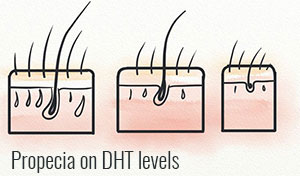
It is a known fact in pharmacy that all drugs have side effects and the same applies to Propecia (Finasteride) but before we address the issue of Propecia’s impact on DHT levels in men with genetic hair loss, its important that you get acquainted with the drug in the first place.
For a start, Propecia (Finasteride) is the only FDA-approved oral drug for alopecia (hair loss). It is highly effective in the treatment of hair loss particularly genetic alopecia in men. With millions of gentlemen across the world finding reprieve after using the drug, there’s no reason as to why it won’t work for you.
What causes baldness?
Baldness is synonymous with old age but there are some cases in which young men in their twenties or thirties start noticing a receding hairline. What happens? Well, a number of factors contribute to this: excessive smoking and drinking, hormonal factors, some preexisting medical conditions and genetics.
As much as you can check your lifestyle and do away with excessive smoking or drinking, you cannot do anything about genetic alopecia. If you’re genetically predisposed then you will get bald not unless you get prescribed to Propecia (Finasteride) early enough. The medication will definitely work for you.
What exactly is genetic hair loss?
Genetic hair-loss is also referred to as androgenetic alopocea or male-pattern baldness in medicine circles. It often follows a certain pattern and is progressive in nature. The condition starts manifesting itself when levels of DHT (dihydrotestosterone) are high. These high levels of DHT weaken hair follicles making them fall off. In addition to this, men with this genetic predisposition tend to have weak hair follicles.
What role does Propecia play in controlling genetic hair loss?
Propecia is without a doubt the best shot one has of controlling hair loss caused by genetic factors. A daily dose of the medication has been known to lower DHT levels. Finasteride (the active component in Propecia) is a 5-alpha-reductase inhibitor. As the name suggests, it prevents conversion of testosterone into DHT implying that the later (DHT) remains at an optimum level. The role of Finasteride is very simple: protect hair follicles from becoming weak and promote growth of new follicles to replace the ones that have fallen off. Start on the medication the minute you notice a receding hairline.
Getting the best out of Propecia
If taken in the right dose and at the right time, Propecia will help you manage hair loss. For a start, you must stick to the prescribed 1-ml or 5-ml daily dose taken at a certain time (obviously not less than 24 hours after the preceding intake). Do not miss or skip a dose because doing so can be detrimental. You might also be undoing the progress you were making in the quest to fight off a receding hair line.
Do not be downbeat or pessimistic about hair loss particularly if you’re not past your thirties. There is a solution that has been tried and tested. Order Popecia (Finasteride) online today and get it delivered right at your doorstep.
